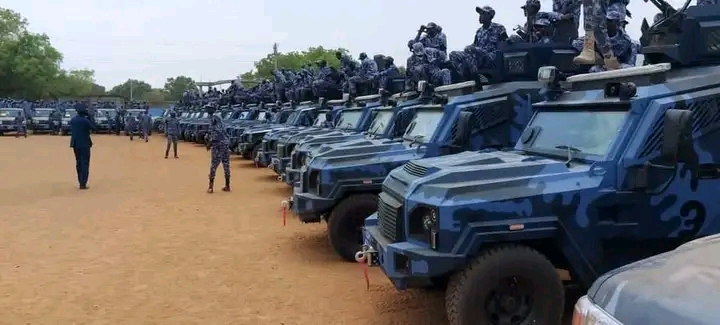The South Sudan National Police services have received 150 vehicles to increase operational effectiveness across the country and maintain law Continue reading Police receive 150 vehicles to ease mobility across the country
Category: States
States
Bentiu authorities deny obstructing journalists from coverage
Authorities in Bentiu Town of Unity State have refuted claims, obstructing journalists from media coverage in the area last week.
Continue reading Bentiu authorities deny obstructing journalists from coverage
Gov’t turns four public learning institutions to polytechnic institutes
The Ministry of Higher Education has turned four public learning institutions to polytechnic institutes to offer vocational skills to young people in the country.
Continue reading Gov’t turns four public learning institutions to polytechnic institutes
Gov’t urged to promote learning of mathematics and science in schools
The Japan International Cooperation Agency has called on the government to promote teaching and learning of mathematics and science in primary schools in South Sudan.
Continue reading Gov’t urged to promote learning of mathematics and science in schools
Mayiandit, Leer youths call for peaceful coexistence
A group of youth from Mayiandit and Leer Counties of Unity State have called for a peaceful coexistence among the two communities.
Continue reading Mayiandit, Leer youths call for peaceful coexistence
National gov’t blamed for neglecting agriculture in Upper Nile
Authorities in Upper Nile state have blamed the national government for neglecting agriculture in the state.
Continue reading National gov’t blamed for neglecting agriculture in Upper Nile
Cattle keepers start leaving Magwi County, says area Commissioner
Cattle keepers from the restive region of Jonglei have started leaving Magwi County of Eastern Equatoria state to their home of origin, according to the area commissioner.
“They started the move on 9th of this month, when they started it, I witnessed myself. I have seen many crossed that side and going towards Aru-junction following the main road,” said Magwi County Commissioner Otto David.
In recent weeks, the area witnessed deadly clashes between cattle herders and the host community, displacing thousands of locals there.
Following the incident, the state governor and members of parliament at the national legislature condemned the cattle keepers presence there and demanded that they return to their area.
Earlier on, the Bor Youth Association in Juba announced that the herders had planned to move back to their home area after they received a thousand doses to vaccinate their animals.
According to the association, the cattle were moved to Eastern and Central Equatoria due to fear of an outbreak of East Coast Fever.
Other factors they cited, are the floods and insecurity in Jonglei state.
“So, this the current situation and the communities have a bit of improvement and are trying to go back to their houses,” Otto added.
In 2017, President Salva Kiir issued a decree ordering cattle keepers to move all their livestock out of the greater Equatoria region.
A committee was also set up to ensure that the animals were returned to their respective states.
But this didn’t bear fruits.
Malakal hospital runs out of testing kits amidst rise in HIV, Hepatitis B cases
The medical director of Malakal Teaching Hospital has said the facility is faced with shortages of drugs , lack of testing kits for HIV and Hepatitis B amidst rising cases of the diseases in the town.
Dr. Khat Deng said there was a surge in the rates of infections in the communities, but the shortage of testing kits made it difficult to ascertain the rate of infections.
“Yes, for testing kits we are lacking them. So, we have seen the rates of cases of hepatitis B infection and HIV there are circulating in the community, but because of this issue, to assess this viral cases is so difficult,” said Medical Doctor Deng.
Deng Went on, saying “If we are now in a position to minimize these cases we supposed to provide this testing kits freely when we provide them we will aware the community and everyone should make screening and voluntary screening.”
Since the 2016 conflict, several NGOs and UN agencies have been conducting awareness activities about HIV and Hepatitis B diseases in the area.
Dr. Deng is now calling on the residents of Malakal to go for voluntary testing to know there status.
For his part, the acting director-general of Malakal Teaching Hospital, said the hospital is grappling with an acute shortage of drugs and basic equipment that includes x-rays and ultra-radiography.
“We have drugs problem, you see the last consignment of drugs came last July to the hospital from the partners, and the drugs from the national government came here since 2019 and up to now we did not receive any drugs from the national ministry of health,” said medical doctor Nyango John Adwok.
Dr. Adwok also said the facility is also understaffed presenting another blow to their work in providing health services to the populace.
“The nurses we have are only nine right now, so the workers are few. And we don’t x-ray, we don’t ultra-radiography in the hospital,” he said.
Pibor women demand equal opportunity, freedom on social participation
Women in the Greater Pibor Administrative Area have called for equal opportunity and freedom to enable their full participation in the society.
Continue reading Pibor women demand equal opportunity, freedom on social participation
Dialogue between three communities from Unity State starts in Juba
The communities of Leer, Mayiandit, and Koch Counties in Unity State have initiated a peace and reconciliation dialogue in Juba.
Continue reading Dialogue between three communities from Unity State starts in Juba

